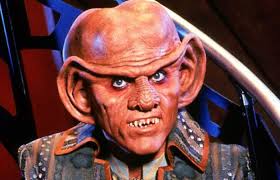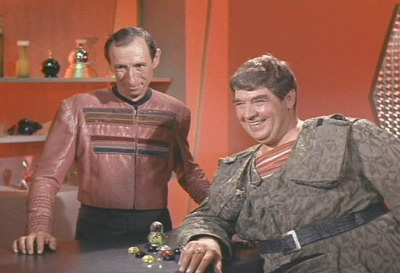In a forum I frequent, the question of the economic system of Star Trek came up, and as someone who is both a fan of free market capitalism, and also very involved in post-scarcity economic theory, I had a few thoughts. Specifically, a number of people seem to think that Star Trek is a demonstration of a socialist economy, and I can’t disagree more.
It’s worth remembering the definition of socialism:
“a political and economic theory of social organization which advocates that the means of production, distribution, and exchange should be owned or regulated by the community as a whole.”
Source: https://www.google.com/search?q=socialism+definition
Although there’s conflicting evidence about whether or not there is money per se in the 23rd century (they mention “credits” in TOS, but Kirk clearly says they don’t use money in ST4:TVH), they definitely still have private property. Look at Sisko’s restaurant in New Orleans in DS9, or the Picard family vineyard in TNG (and PIC, apparently). This despite the fact that Picard makes a statement about not being interested in the acquisition of “things” in the last episode of Season 1 of TNG (“The Neutral Zone”).
So yes, although the economy is definitely different (replicator technology making units of currency largely irrelevant), the concept and practice of private property is definitely there. This is called a “post-scarcity economy” and the implications are dramatic and largely not understood in terms of contemporary economics.
Basically, a post-scarcity economy is one in which the value of goods is not driven by supply and demand. Usually, this is envisioned as a consequence of molecular assemblers and/or some sort of nanotechnology that can basically create anything on demand. It implies, but doesn’t necessarily require, essentially limitless energy.
This is something that Star Trek has. They’re called replicators. In TOS, they were called “food processors” and seemed to be somewhat more limited in their scope, but by TNG they were fully integrated into Federation (and Klingon and other societies’) cultures.
Where I think this radically differs from socialism is in the distribution of the means of production. While there are industrial replicators which seem to be under the control of the government (and which seem to be mentioned in the context of disaster relief and new colonization projects), we know there are household replicators as well, which pretty well represents the ultimate in non-state-ownership of the means of production.
It’s very close to “every person a factory owner.” When the means of production are so radically distributed to the individual, that seems to me to be the antithesis of socialism, which requires centralized control or at the very least regulation of the means of production.
Even in the TNG/DS9/VOY era there are still some substances that seem to be beyond the capabilities of replicators. Dilithium stands out prominently as something that still needs to be mined. Biomemetic gel (whatever it is), is closely regulated and controlled, which implies that it can’t be created by just anyone who has a replicator. And so on.
Biological substances in particular seem to be subject to this limitation. Witness the efforts of the Ferengi to obtain the rights to tulaberry wine from the Gamma Quadrant in the first seasons of Deep Space 9. If it was possible to just scan a bottle of wine and crank out endless liters of the stuff, that’s exactly what the Ferengi would have done. But for some reason they have to go to the source, and thus treaties and trade agreements are made.
It’s worth noting that this restriction doesn’t apply to things like normal alcohol, which we see being provided by replicators throughout TNG, DS9, and VOY. On the other hand, we see that hand-grown vintages like Chateau Picard are prized for the simple fact that they are hand-grown. The same applies to Sluggo Cola or Joseph Sisko’s creole shrimp.
This would seem to imply that there’s a cultural value placed on at least some substances that are not replicated. This, despite the fact that a replicator could, in theory, duplicate a bottle of Chateau Picard 2347 down to the last molecule. The fact that it wasn’t replicated, in and of itself, gives value. One imagines a black market in replicated fakes.

The Ferengi are an interesting anomaly. Even in a post-scarcity society with replicators, they still maintain the trappings of a market-based economy, even with a futures commodity exchange. There are two explanations for this, neither of which is mutually exclusive.
First, there is a certain level of cultural atavism at work; they maintain the trappings of a market-dependent economy because that’s what their culture and their religion demands. But they’re also depicted as a particularly practical people when it comes to getting profit.
The second possibility is that their economy is aimed at interactions with cultures who do not, themselves, possess replicator technology, and thus are not aware of the complete imbalance in trade that replicator technology provides. But we do see them trading with all sorts of advanced cultures, so this is somewhat off, and we need to fall back on the idea that replicated items are perceived to be of lesser value, despite being literally identical according to the canon. The fact that restaurants which feature food made “the old fashioned way” with people peeling potatoes speaks to this perceived value which is added by individual effort.
It’s an artisan economy, and people are willing to exchange units of exchange (credits) for artisanal goods, despite the fact that replicated goods are available, speaks to a cultural preference for such things.
The relationship between the Ferengi and gold (and latinum) is a special case. Gold goes from being incredibly valuable to them in TNG (“The Last Outpost”) to being literally worthless in DS9 (“Who Mourns for Morn?”), so it’s not like the writers consistently thought this aspect through across the entirety of the various series.
The bottom line is that although the Star Trek universe shows a very different economic order than ours today, that does not equate to a socialist economy. The fact that the means of production is literally in the hands of just about every individual is at complete odds with the definition of socialism. Too, we see that artisanal goods still hold value over and above mere replicated goods, and that people are willing to exchange units of credit to possess and consume them.










I wrote something along the same lines, although it was more concerned with money itself, but I did touch on the economy.
http://www.thehammerstrikes.com/2018/03/how-money-in-star-trek-works.html
Excellent post, thank you!
I was just watching “Encounter at Farpoint” as a warm-up for “Picard”, and was surprised when Dr. Crusher bought a bolt of fabric with the line, “Charge it to my account on the Enterprise” or something close to that. I remembered Kirk, Picard, and others preaching about the barbarism of money-based societies on multiple occasions, but here we had clear proof that (at the time of TNG) they were one. I chalk that up to inconsistency among writers, but the specific example does highlight a case where replicator technology doesn’t obsolete other means of production: you don’t necessarily know what it is you want until you encounter it, and without the (perhaps unique, and even if not, perhaps not cost-effective to digitize) object in question, a replicator wouldn’t be able to replicate it – if she hadn’t bought it then and there, would she have been able to describe this object in sufficient detail for a replicator to replicate it?
Anyway, cool post!
Imagine if food and shelter and basic needs were provided for everyone because of replicators.
We never see Robots (beyond Data) so maybe they’re doing menial work just to keep busy and give their life some kind of meaning since they didn’t pass the Star Flee entrance exams. Maybe the bulk are holodeck addicts.
Great post.
I do seem to remember that they don’t mine Dilithium crystals in TNG anymore. They use synthetic ones.
While I think there are numerous inconsistencies in the writing, I don’t think the 23rd-24th Century Federation is a truly post-scarcity economy. It would probably be more accurate to say that most real necessities were simply of negligible monetary value, assuming the future actually needs to assign monetary value to such things at all.
I don’t believe it was ever established that everybody in the NextGen era Federation had direct access to their own personal replicators. Some certainly did, but others resorted to using a public “replimat” owned/controlled by someone else like in DS9. Also, I think you are overstating the fidelity of replicator technology, since certain individuals like Robert Picard and Sisko’s mother, believed they could distinguish replicated food from the original (possibly true, possibly not). There was a long list of things Federation replicators apparently could not make, including complex life forms (although they had a limited ability to make organs of presumably living tissue).
Even in a true “post scarcity economy” there is the question of intellectual properties, which are mechanically as freely reproducible today as they are likely to be in three hundred years. Even if everybody can control the production of their own ideas, the results will be of widely different and presumably fungible quality. And from our current understanding of economics, intellectual property rights pretty much demand some form of regulation since in that context possession is zero tenths of the law.
Of course, this is from our current understanding of economics, which almost certainly is not complete. Personally, I’ve always thought that the Federation economy is meant to be based on a model we simply haven’t thought of yet, likely of Vulcan origin, in which “capitalism” and “socialism” are quaintly archaic, largely obsolete terms (like the”Yangs” and “Koms” from “The Omega Glory.”) How does the Federation economy work? The writers don’t know, any more than they know how to build a warp drive or transporter or gravity generator. In some ways it looks like capitalism, in others like socialism, but largely it’s a big black box in the narrative that isn’t intended to fit any currently known model.
It’s interesting you bring up the question of intellectual property, as Voyager actually did address that explicitly in the episode “Author, Author” where the question of copyright is brought up. They never really say what the implications of the arbitration are, aside from the power to decide how and by whom a given piece of IP is distributed. It’s entirely possible that such things aren’t done for credits so much as credit. (heh)
Although if it is the former, then the author of “Vulcan Love Slave” certainly has a lot of latinum to roll around in.
As for the question of household replicators, we do see repeated references to such, both in “Family” where arguments between Picard’s parents on the subject are mentioned, as well as when O’Brien tells an unbelieving Keiko that his own mother never wanted a replicator in the house. It’s interesting to note that both instances (as well as the Sisko reference you mention) are about the previous generation having these discussions, so it’s fair to assume that the introduction of the replicator as a kitchen appliance (at least) came some 30-40 years before the TNG/DS9 era. Now, whether that kitchen replicator was actually a true household replicator is unknown, but we have repeated references to “poverty” being eliminated on Earth by the TNG era (and some less concrete references in TOS), and the simplest explanation to my mind would be that the same household appliances that can make shrimp Creole and potato casserole can make clothing and other household goods.